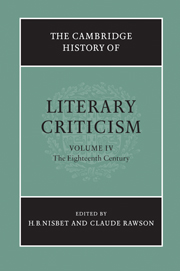Book contents
- Frontmatter
- INTRODUCTION: CRITICISM AND TRADITION
- GENRES
- LANGUAGE AND STYLE
- THEMES AND MOVEMENTS
- 18 Sensibility and literary criticism
- 19 Women and literary criticism
- 20 Primitivism
- 21 Medieval revival and the Gothic
- 22 Voltaire, Diderot, Rousseau and the Encyclopédie
- 23 German literary theory from Gottsched to Goethe
- 24 The Scottish Enlightenment
- 25 Canons and canon formation
- LITERATURE AND OTHER DISCIPLINES
- Bibliography
- Index
- References
19 - Women and literary criticism
from THEMES AND MOVEMENTS
Published online by Cambridge University Press: 28 March 2008
- Frontmatter
- INTRODUCTION: CRITICISM AND TRADITION
- GENRES
- LANGUAGE AND STYLE
- THEMES AND MOVEMENTS
- 18 Sensibility and literary criticism
- 19 Women and literary criticism
- 20 Primitivism
- 21 Medieval revival and the Gothic
- 22 Voltaire, Diderot, Rousseau and the Encyclopédie
- 23 German literary theory from Gottsched to Goethe
- 24 The Scottish Enlightenment
- 25 Canons and canon formation
- LITERATURE AND OTHER DISCIPLINES
- Bibliography
- Index
- References
Summary
Do women have the right to criticize? Throughout the eighteenth century it was commonly held that literary judgement was – or should be – a privilege reserved for men. A woman who set forth literary opinions in public exposed either her folly or her presumption. Women, according to Jonathan Swift, were the ‘ill-judging Sex’, inclined, like Echo, to take more delight in repeating ‘offensive Noise’ than in celebrating Philomela's song. Henry Fielding, playing the role of ‘Censor’ to the ‘great Empire of Letters’ in the Covent-Garden Journal, debarred all ‘fine Ladies’ from admission to the lofty ‘Realms of Criticism’. Women, he averred, spoke only a debased critical language, a repetitious modern lingo composed of the phrases, ‘sad Stuff, low Stuff, mean Stuff, vile Stuff, dirty Stuff, and so-forth’. They were ‘Gothic’ marauders in the republic of letters, usurping authority ‘without knowing one Word of the ancient Laws, and original Constitution of that Body of which they have professed themselves to be Members’. In the 1750s Oliver Goldsmith and Tobias Smollett took turns reviling Isabella Griffiths, the wife of Ralph Griffiths, who had dared to emend Goldsmith's works and publish reviews of her own in her husband's Monthly Review. Smollett boasted that his own journal, the Critical Review, was free of the depredations of ‘old women’ like Griffiths, whom he dismissed, with palpable sexual disgust, as the ‘Antiquated Female Critic’. In 1769, when Elizabeth Montagu published her only critical work, The Writings and Genius of Shakespeare, James Boswell worried aloud about resentment which might be aroused by a woman ‘intruding herself into the chair of criticism’ and was eager to defend his mentor Samuel Johnson against charges of prejudice against his bluestocking rival.
- Type
- Chapter
- Information
- The Cambridge History of Literary Criticism , pp. 434 - 455Publisher: Cambridge University PressPrint publication year: 1997
References
- 7
- Cited by

